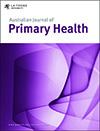Australian Journal of Primary Health
Volume 30
Number 6 2024
Chronic pain affects one in five people in Australia and has a high economic burden on individuals and the health system. Upskilling primary care providers in best practice pain care is critical. The South Australian (SA) Chronic Pain ECHO Network was established to improve knowledge, confidence, attitudes and practice of primary care providers and provide professional support. The ECHO Network model was found to be an acceptable and effective model for upskilling primary care providers in best practice pain care.
It is unknown whether health literacy instruments measure the same health literacy construct. This study compares psychometric properties and correlations between four widely used instruments: two performance-based functional health literacy instruments (Test of Functional Health Literacy in Adults and Newest Vital Sign) and two self-report multidimensional instruments (European Health Literacy Survey and Health Literacy Questionnaire). New insight into the different constructs these instruments measure and implications for their application in research, policy, and clinical practice is presented.
Gaps in diagnosis of chronic hepatitis B (CHB) and chronic hepatitis C (CHC) contribute to ongoing adverse outcomes, however, data regarding testing coverage are limited. In a large representative primary care population, a key setting for testing, a substantial proportion of people with established indications for testing had no evidence of it, including many with evidence of liver disease. Primary care practices should be supported to comprehensively offer testing for viral hepatitis for those at risk.
There is a clear need for more research prioritising former refugees’ experiences of health care in their settlement countries; however, this research is known to be ethically and methodologically challenging. We found successful and ethical engagement with former refugees in qualitative health research is based on carefully establishing relationships, having a responsive suite of methods during fieldwork and finding meaningful ways to communicate. Our reflections and analysis will help others engage in this much needed area of research.
In Australia, while numerous vaccines are nationally recommended and funded for both children and adults, there are instances where vaccines are recommended but not funded. Using a national cross-sectional survey targeting adults aged 50 years and above, this study investigates factors influencing vaccine acceptance, revealing significant associations between demographics and vaccine uptake. This highlights the importance of funding for vaccination and identifies a gap in how to best increase uptake for vaccines which are recommended but not funded.
Abortion care is typically undertaken by doctors; however, alternate models, including nurse-led care, are increasingly seen as viable alternatives that could increase access and facilitate safe abortion. We explored the acceptability of different models of abortion care and whether attitudes differed by health profession. Most health professionals working in sexual and reproductive health care perceive that nurse-led models of care are a viable, acceptable and important next step in sexual and reproductive health care, whereas self-administered abortion is seen as unsafe.
Interventions are needed to support general practice nurses (GPNs) to provide primary care that meets the needs of people living with dementia and carer(s). This study provides new knowledge on the experiences and expectations of GPN care from the perspective of people living with dementia and carer(s). Understanding the care recipient experience can inform the development of interventions to support the GPN provision of dementia care that meets the healthcare needs of people living with dementia and carer(s).
Violence against women is an urgent global public health problem. Primary healthcare workers play an important role in preventing and managing violence. However, health workers perceive this situation beyond their responsibilities; political, personal and cultural reasons are thought to be factors. Our study sheds light on the barriers and needs in violence against women detection, and management in primary health care. Overcoming these challenges may contribute to better practices, better patient care and, ultimately, a safer and healthier society.
Quick response (QR) codes are a ubiquitous part of society. However, the role of QR codes for linking to health information in general practice waiting areas has not yet been explored. We investigate the user’s experience and views on using QR codes to access digital health resources in the general practice waiting room setting. Our findings highlight enablers and barriers of QR code engagement in a health service waiting room setting.





